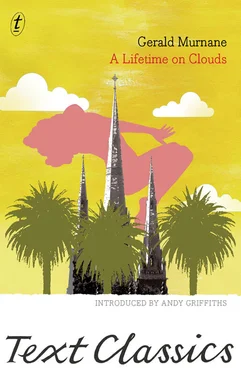But if the young Englishman had a hard time, it was harder still for the poor Irish lad. Adrian Sherd had no doubt that in all the history of the world the worst possible place for a young man was Ireland after St Patrick had converted it to the Catholic faith.
To begin with, the country was overcrowded. Watchful old men sat outside every cottage door and pious old women in black shawls passed to and fro along every country lane. A young man trying to spy on a girl or catch her alone in a quiet place was nearly always reported to the parish priest.
Even the landscape was against the young Irishman. There were no dells or dingles or forests or prairies in Ireland. The country was mostly bare stony fields and peat bogs. When a young fellow finally grew so desperate that he had to do it to himself, the only place he could go was behind the largest stone on some hillside. Many a time the stone was not even big enough to hide him properly and he had to lie with his legs drawn up or crouch like a hare against the grass while he relieved himself as best he could. If he forgot himself in his excitement and let his twitching legs protrude from behind the stone, he was sure to be observed by some gossiping jarvey on the nearest road.
It was almost certainly this problem that drove the early Irish explorers out into the Atlantic. They were looking for the Western Isles or O Brasil, Isle of the Blest — some uninhabited place where a young man and his girlfriend or a man and his wife or just a young man by himself could get away on their own whenever he felt like it. If the Irish had reached America, as Adrian Sherd’s father claimed they had, it would have been the perfect land for them. They certainly deserved it, after all the misery they had put up with at home.
But there was one thing that helped the young Irishman in his trouble. The women of Ireland practised the virtues of modesty and chastity like no other women in history. Thousands of them spent their formative years as Children of Mary. They imitated Our Lady so faithfully that they ended up looking like Madonnas with their white complexions and their dark eyes demurely downcast. Thanks to the exemplary virtues of Irish womanhood, the young Irishman was never tormented by the sight of bare legs or daring swimsuits. In fact, Adrian suspected that with priests and parents watching them closely, and the women of Ireland so careful not to tempt them, many young Irishmen might have avoided sins of impurity altogether.
When Adrian was still at primary school he used to go every year to the St Patrick’s Night concert in his local town hall. One of the items was always Eileen Aroon sung by a choir of girls from Star of the Sea Convent, North Essendon. When the girls came to the words, ‘Truth is a fixed star,’ Adrian was always so inspired by the unearthly beauty of the melody and the innocent upturned faces with their rounded pink lips where no foul young man had ever planted an impure kiss, that he looked up past the blazing chandeliers of the town hall, out over the north-western suburbs of Melbourne and across the thistles and basalt rocks of the plains beyond, towards the dark sky over Ireland. There were fixed stars shining over Ireland — the stars in the dark blue mantle of Our Lady, who was still guarding the daughters of that holy country as she had for centuries past.
The last time Adrian had seen the concert (in the year before he began at St Carthage’s) he was so moved that he made a vow never to think an impure thought about any girl with an Irish-looking face or an Irish-sounding name.
Adrian had kept his vow faithfully. None of the hundreds of females he had used for his pleasure had been Irish types. But he often wondered how he would have survived in the Ireland of his ancestors, where the only girls he ever saw would have been Irish colleens. Probably he would have emigrated as his ancestors had done. He hoped he would have had the sense to head for America instead of Australia.
On some afternoons Adrian Sherd caught a tram instead of walking down Swindon Road from St Carthage’s to the Swindon railway station. The tram was always crowded with boys from Eastern Hill Grammar School and Canterbury Ladies’ College. Adrian knew that these schools were two of the oldest and wealthiest in Melbourne. He felt very ignorant not even knowing where they were among the miles of garden suburbs beyond Swindon.
Whenever he looked at the Eastern Hill boys Adrian felt awkward and grubby. He held his Gladstone bag in front of his knees to hide the shiny domes in his trouser legs. He remembered all the brothers’ talk about St Carthage’s being a fine old school with a reputation for turning out Catholic doctors and barristers and professional men. It was bullshit. The Eastern Hill boys never saw Adrian, even when he was crowded so close that his sweaty maroon cap was only inches from their faces. When the tram lurched and he fell among them, the superb voices kept up their banter while one of the fellows brushed Adrian away like some kind of insect.
After a few weeks on the trams Adrian learned to stand unobtrusively near these young gentlemen, keeping his back to them but listening carefully.
One Eastern Hill fellow went to a party every Saturday night. The parties were in strange places that Adrian had never heard of — Blairgowrie, Portsea, Mt Eliza. At Blairgowrie the fellow had met a girl called Sandy and taken her home and crashed on with her. He said he was going to ring her up and ask her out to a party at Judy’s place in Beaumaris. Judy’s parents were to be in Sydney for the weekend. The party would be a riot.
The fellow went on talking, but Adrian couldn’t take any more. He wanted to sit down in a quiet place and try to comprehend the incredible story he had just heard. But then the fellow told his friends he must move along the tram and win Lois. Adrian had to watch.
The fellow walked purposefully up the tram and leaned over a group of Canterbury girls. A girl with shapely legs and large innocent eyes gazed up into his face. They talked. She nodded and smiled. The fellow said something funny. He let it slide out of the corner of his mouth. The girl leaned back and showed the full length of her white throat and laughed. The fellow stood back and admired his work. Then he said goodbye and walked back to his friends.
They took the whole thing quite calmly. One of them said, ‘Are you going to ask her out?’
The party-goer said, ‘I don’t really know. She’s a nice kid. She’d be lots of fun. I think her parents make her study most weekends. I might wait and take her out to some quiet party not too far from her home.’ The others were gentlemen enough to drop the subject.
It was some weeks before Adrian dared to stand near the Canterbury girls. He didn’t want to offend them with the sight of his pimply face and crumpled suit and the Catholic emblems on his pocket and cap.
There were four Canterbury girls who were always huddled at one end of the tram. Whenever Adrian sneaked a look at them they were chattering or smiling with their gloved hands pressed daintily to their lips. They spoke so confidentially to each other that he guessed they were talking about boys. Each day for a week he stood a little nearer to their seats, always keeping his back to the girls. He hoped to learn something that even the Eastern Hill boys didn’t know.
When he finally stood within earshot of them he was shocked to hear them talking the whole time about clothes — the ones they wore last weekend, the shops where they bought them, the alterations they had to make before they could wear them, the way they creased or crumpled after wearing and what they were going to wear next weekend.
Adrian was disappointed at first, but he worked out later that the girls only worried about clothes because they wanted to look beautiful when they went to parties with the Eastern Hill fellows.
Читать дальше












